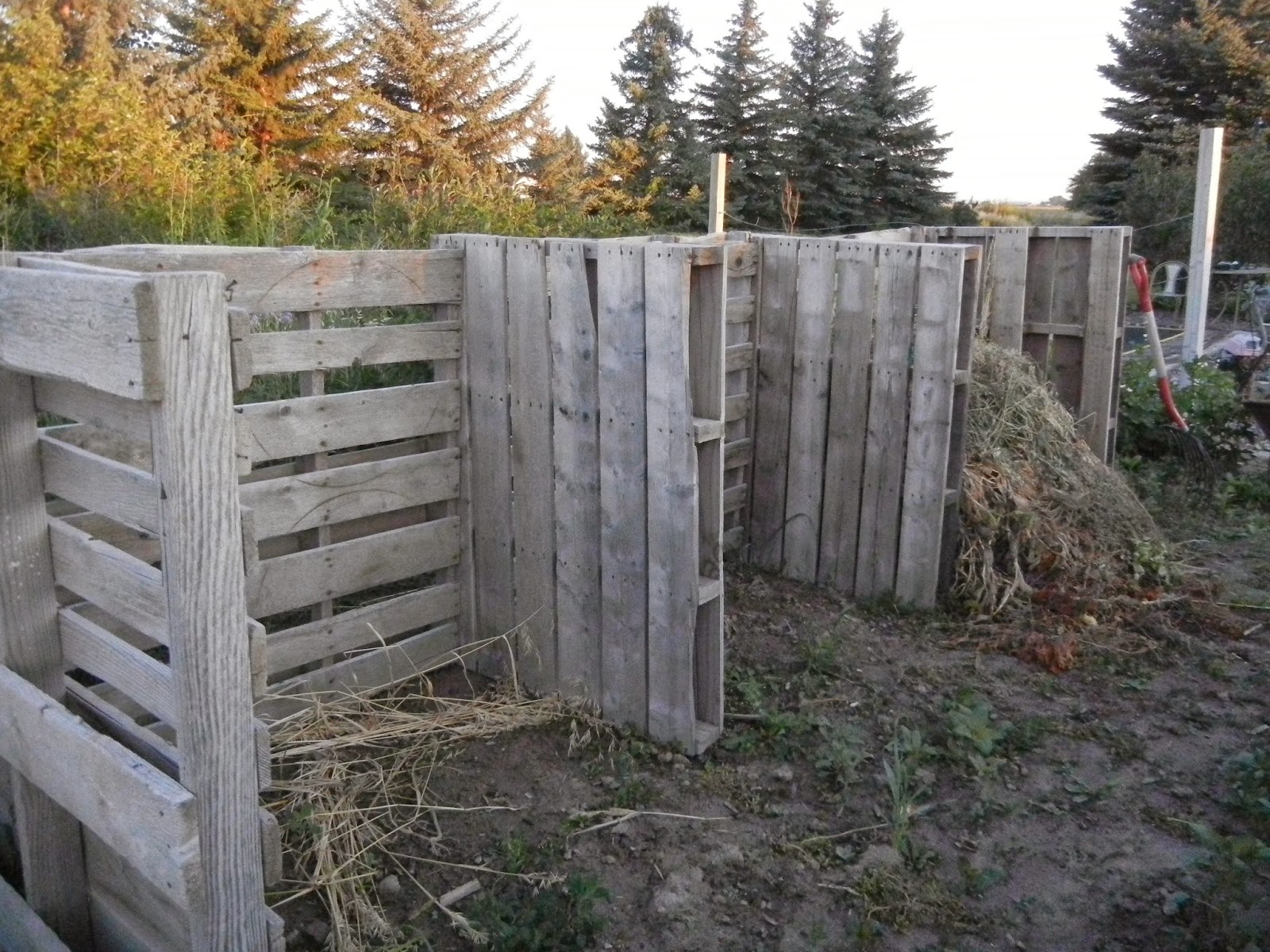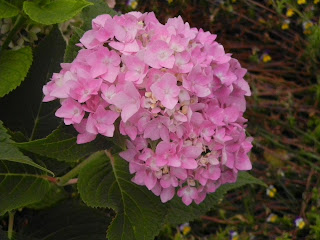Composting in My Three Compartment Bin
My previous post generated the question of how to use the three compartments in the compost bin my son built for me.
I will answer that question, but first I'm going to take a moment to wax eloquent about compost in general.
Have you ever walked in a forest where the ground is so soft it almost feels spongy? Have you then reached down and scooped up a handful of that dirt? What did it look like? Dark, moist, and crumbly? What you were walking on was a thick layer of decomposing organic material. Now I know the word "organic" is thrown around a lot these days, but when I use it here, I mean it literally--as in coming from plants or animals.
Think about what happens in a forest. When plants or animals die, or when plants drop leaves or needles, or when an animal "does its business" that organic material decomposes right in the spot where it falls. As it does so, all of the elements it is made up of are released back into the soil and become available to nourish the next generation of plants. It's nature's way of fertilizing things.
In our yards we are much too civilized to leave organic matter lying around decomposing everywhere. But we can still reap the benefits of the rich soil that is created from decomposing organic matter, only we call it compost. Adding compost to your soil is one of the best things you can do for it regardless of the type of soil you have. Compost will loosen heavy clay soil; increase the water holding capacity of light, sandy soil; temper the ph of highly alkaline or highly acidic soils; act as a slow release fertilizer; and a host of other good things. Compost can be mixed into the soil as an amendment or layered on top as a mulch.
Okay, so now let's talk about how to make compost. It's not hard--anything organic is going to decompose when it dies, nature takes care of that. So you can simply make a pile of weeds, grass clippings, autumn leaves, and veggie peelings, and given enough time, it will decompose and turn into compost. But there are some things you can do to speed the process up.
Decomposition happens most quickly when there is mixture of dry elements, which are high in carbon (dry leaves, straw, newspaper, etc.) and green elements, which are high in nitrogen (grass clippings, weeds, veggie peelings, etc.) You can find recipes that tell you how much of each to include, but don't get too hung up on this. Don't include meat or bones. These are organic but will attract unwanted pests. You can include manure (high in nitrogen) but if you are planning to use the compost in areas where you will be growing food, don't use manure from pets--cats and dogs.
As you build or add to your compost pile, throw on a little dirt. Soil contains microorganisms that do the work of decomposition, so adding dirt to your pile puts those little critters right where you want them.
Keep the pile moist. That's tricky in the dry climate of southeast Idaho, so around here we have to actually water our compost piles.
Occasionally turn your compost pile to add air and mix in the outer material (which is probably decomposing more slowly than the inner material.)
Other than that, just give it time. You compost is complete and ready to use when it looks like dark, crumbly soil.
Now let's talk specifically about my three compartmented compost bin. The idea is to have one bin I am adding new material too (building a compost pile), one bin that is in the process of decomposing, and one bin that is completed compost that I am using.
That is the ideal. BUT It would be nice to have an extra bin to move the pile that is decomposing back and forth between as I turn it, so one more bin would be nice for that. And I am not meticulous about keeping the perfect balance of carbon to nitrogen materials or keeping the pile moist. Plus I live in a dry, desert climate. (In warm, humid climates, it may only take a few months to get completed compost. Here it takes longer.) All that to say, as I said in my previous post, I may have to add another bin or two--so I can have an extra to help with the mixing and a couple that are in the process of decomposing. I'll let you know in a couple of years what I decide.
I will answer that question, but first I'm going to take a moment to wax eloquent about compost in general.
Have you ever walked in a forest where the ground is so soft it almost feels spongy? Have you then reached down and scooped up a handful of that dirt? What did it look like? Dark, moist, and crumbly? What you were walking on was a thick layer of decomposing organic material. Now I know the word "organic" is thrown around a lot these days, but when I use it here, I mean it literally--as in coming from plants or animals.
Think about what happens in a forest. When plants or animals die, or when plants drop leaves or needles, or when an animal "does its business" that organic material decomposes right in the spot where it falls. As it does so, all of the elements it is made up of are released back into the soil and become available to nourish the next generation of plants. It's nature's way of fertilizing things.
In our yards we are much too civilized to leave organic matter lying around decomposing everywhere. But we can still reap the benefits of the rich soil that is created from decomposing organic matter, only we call it compost. Adding compost to your soil is one of the best things you can do for it regardless of the type of soil you have. Compost will loosen heavy clay soil; increase the water holding capacity of light, sandy soil; temper the ph of highly alkaline or highly acidic soils; act as a slow release fertilizer; and a host of other good things. Compost can be mixed into the soil as an amendment or layered on top as a mulch.
Okay, so now let's talk about how to make compost. It's not hard--anything organic is going to decompose when it dies, nature takes care of that. So you can simply make a pile of weeds, grass clippings, autumn leaves, and veggie peelings, and given enough time, it will decompose and turn into compost. But there are some things you can do to speed the process up.
Decomposition happens most quickly when there is mixture of dry elements, which are high in carbon (dry leaves, straw, newspaper, etc.) and green elements, which are high in nitrogen (grass clippings, weeds, veggie peelings, etc.) You can find recipes that tell you how much of each to include, but don't get too hung up on this. Don't include meat or bones. These are organic but will attract unwanted pests. You can include manure (high in nitrogen) but if you are planning to use the compost in areas where you will be growing food, don't use manure from pets--cats and dogs.
As you build or add to your compost pile, throw on a little dirt. Soil contains microorganisms that do the work of decomposition, so adding dirt to your pile puts those little critters right where you want them.
Keep the pile moist. That's tricky in the dry climate of southeast Idaho, so around here we have to actually water our compost piles.
Occasionally turn your compost pile to add air and mix in the outer material (which is probably decomposing more slowly than the inner material.)
Other than that, just give it time. You compost is complete and ready to use when it looks like dark, crumbly soil.
Now let's talk specifically about my three compartmented compost bin. The idea is to have one bin I am adding new material too (building a compost pile), one bin that is in the process of decomposing, and one bin that is completed compost that I am using.
That is the ideal. BUT It would be nice to have an extra bin to move the pile that is decomposing back and forth between as I turn it, so one more bin would be nice for that. And I am not meticulous about keeping the perfect balance of carbon to nitrogen materials or keeping the pile moist. Plus I live in a dry, desert climate. (In warm, humid climates, it may only take a few months to get completed compost. Here it takes longer.) All that to say, as I said in my previous post, I may have to add another bin or two--so I can have an extra to help with the mixing and a couple that are in the process of decomposing. I'll let you know in a couple of years what I decide.




Comments
Post a Comment